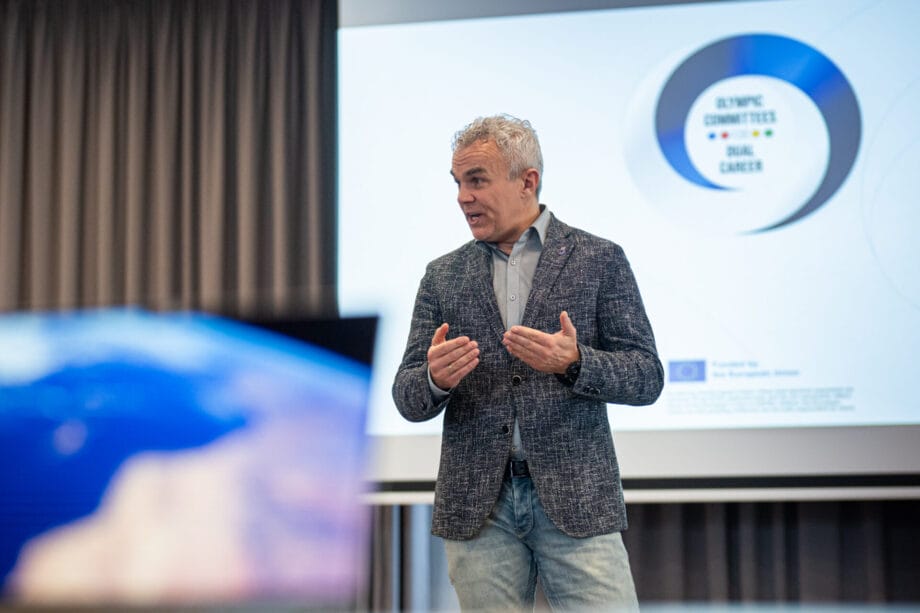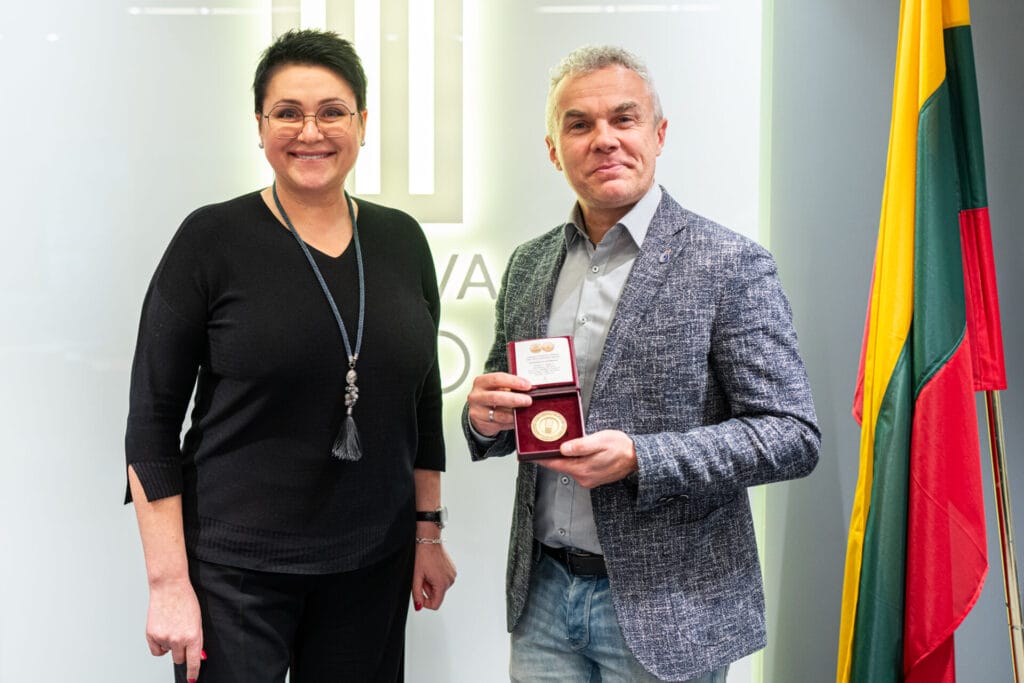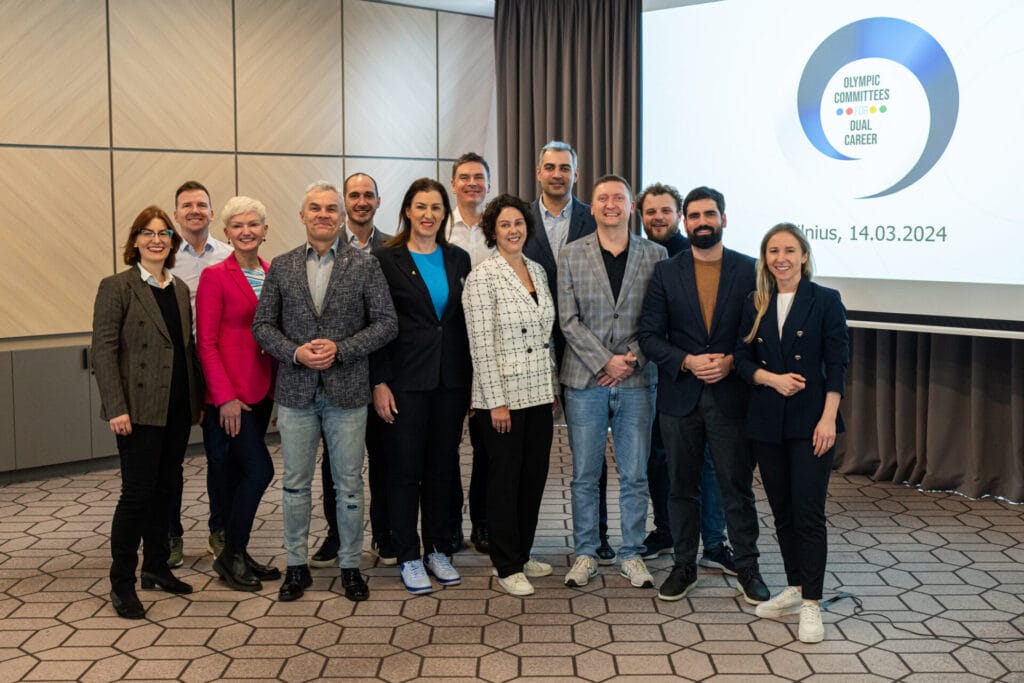LITHUANIAN NATIONAL OLYMPIC COMMITTEE

“Yes, I can serve as an example of an athlete exercising a dual career,” Marcin Nowak smiles, a former Polish sprinter, participant of the 2000 Sydney and 2008 Beijing Summer Olympics, and Chairman of the Organising Committee of last year’s European Games in Krakow, Lesser Poland and Silesia. He visited Lithuania in the position of the mastermind of the dual career project he initiated more than two years ago.
The OCDC (Olympic Committees for Dual Career) project finished last week, with its organisers and promoters gathering in Vilnius to discuss the results and to share their experiences and discoveries. Here, the representatives of five National Olympic Committees, including the National Olympic Committee of Lithuania (LNOC), made the final touches to this international project. The initiative resulted in the launching of a free platform for athletes to receive training on human resources, mental health, branding, communication, marketing and other relevant topics.
Marcin, how did you come up with the idea to create a project dedicated to athletes’ dual careers?
This project was born because in recent years, when working for the Polish Ministry of Sport and Tourism or the Polish Olympic Committee, I have seen many athletes who find it very difficult to start a new life after finishing their careers in sport. This is a problem relevant in many countries: how do we help people to make the transition from a career of a sports professional to regular ordinary life?
The journey of an athlete is a short one, and few earn enough to last the rest of their lives. But even if you have enough money, you still need to realise yourself in a certain area. That was the main reason for creating this project in the first place. We wanted to share our experience with the Olympic Committees of other countries and to see how they deal with this issue.
Was it easy for the Polish Olympic Committee to mobilise partners and get funding?
We started the project more than two years ago, however until then we had been reflecting on it in our heads and plans. It was not easy to get the partners together, to explain to them exactly what we were trying to achieve, how we saw things. But we managed to achieve this. We applied for funding to the European Union’s Erasmus+ programme and received it. We invited colleagues from Lithuania, Slovenia, Turkey, Greece and one NGO to join our ranks and cooperate.
Did the project take off easily?
It did. Every National Olympic Committee keeps a lot of contact with the athletes in their own country ‒ after all, the project is meant for them. And at least in Poland, I am now witnessing the results of this work.
How do you work with the athletes? Did you analyse their expectations when you started the project?
Yes, we looked at what they expect. And the purpose of working with athletes was to open their eyes, to remind them that a second, or dual, career is inevitable, and that they had better prepare for that in advance.
But many athletes, while being in their twenties and basking in the glow of fame, don’t even think that it will all end one day. How do you reach such a person?
That’s why we talk to athletes who are still active in sport, even to young people, teenagers, and remind them that they should start thinking about a dual career right away, because once you are done with sport, it might be too late to start anything else. Sometimes careers end very early due to various injuries. The most effective way to talk about it is by showing examples of other athletes, even champions.

D. Gudzinevičiūtė and M. Nowak.
What do you usually offer to athletes: training courses, seminars or something else?
It depends on which project country chooses what. We have generally agreed that each Olympic Committee should have a dedicated person who would keep direct contact with the athletes and who the athletes could contact if they had questions about their dual careers. The very first task of such a dedicated person is to educate, because most changes start in the brain. This post would be best suited to a former sports professional who knows both their generation and the young people. Our project representative or representatives talk to the athletes during their camps, organise certain training, conferences, liaise with the federations of the individual sports, with sports managers, and remind them that they need to take care of the future of those who play sport today.
Do you know any success stories of how former athletes have discovered themselves in another field over the years?
Of course I do. In Poland alone, we have involved in the project four top-performing athletes, champions in their respective sports. I keep mentioning the example of one of the project coordinators, Luisa Zlotkowska. She is a former short track speed skater, a two-times Olympic medallist, and now she is the kind of person who helps other colleagues, who shows them that the first success and glory is in the past, and that they need to move on to something else now.
I have noticed that all the Polish sports federations ‒ and I believe the same applies in Lithuania ‒ are very much interested in this project and want to cooperate. We will come up with new tasks and challenges for them to keep the project going, even though it will formally end soon.
You yourself are also a great example of a dual career. When did you finish your career in track and field athletics?
In 2013. I am one of the lucky ones, because right after finishing my career I already had something to do, I started teaching at a university in Krakow.
Did you do your higher education degree while you were still active sport?
Yes. I had never forgotten that life will go on after I stop running. I was just lucky. I had an MA in sports theory, and I also studied sports marketing and management. For the last ten years, I have been working for the Ministry of Sport and Tourism, the Polish Olympic Committee, and I have been involved in major sport projects all over the country.
Is that how you became Chairman of the Organising Committee of last year’s European Games?
I was chosen to become one. As I said, I am lucky, because everything turned out so well and without any career breaks. When I left sport, there was no system in place for the integration of athletes, no dual career projects for them, unlike now, no dedicated staff to guide athletes to the next stage of life, to give them the tools to build it. At the time when I left my career, athletes could only rely on themselves or their parents, if they were able to guide them in due time to study, if they advised them to get a degree.

Were the European Games, a huge project with athletes from 48 countries competing, your life’s challenge?
They certainly were. And not only for me, they were a challenge for the whole country and even for Europe and its Olympic Committees. These were the third European Games, the previous two being held in Belarus and Azerbaijan. It was the first time we moved to a European Union country, so the rules, the procedures and other things were completely different from what we had been doing before.
I think we have coped with the task well and have received a lot of excellent feedback. These Games were described as of the highest level, with the best organisation in its short history. Everybody compared our event to the Olympic Games. Indeed, we had achieved the same level to that of the Olympic Games with our standards and all the procedures, with athletes’ performance, with the broadcasting. During the organisation, we faced the biggest challenges one might encounter: the finishing COVID-19 pandemic and its repercussions, the terrible war in Ukraine. After all, Poland is almost a frontline country, while terrible things have happened and are still happening in the neighbouring country. Security was certainly not our last concern.
Did you have to invest in infrastructure as well?
We followed the principle of sustainability: where possible, we made use of existing facilities, and when necessary, we made renovations. For some competitions, we set up temporary spaces or grounds. For example, we set up the ground for the 3×3 basketball tournament, built the canoe canal as well as the field for the triathlon competition. After the Games, these facilities were taken down. This way we avoided wasting a lot of money and we did not build anything we would not need afterwards. For example, after the Athens Games, the city was left with a lot of sports grounds that nobody needs today. We avoided that problem because we followed the International Olympic Committee’s guidelines on avoiding to build, for the purposes of the Games, something which would not be used later.
What are your plans for your dual career?
I am still working at the Organising Committee of the European Games; not everything has been completed yet, and afterwards I will look forward to new challenges (smiles).
